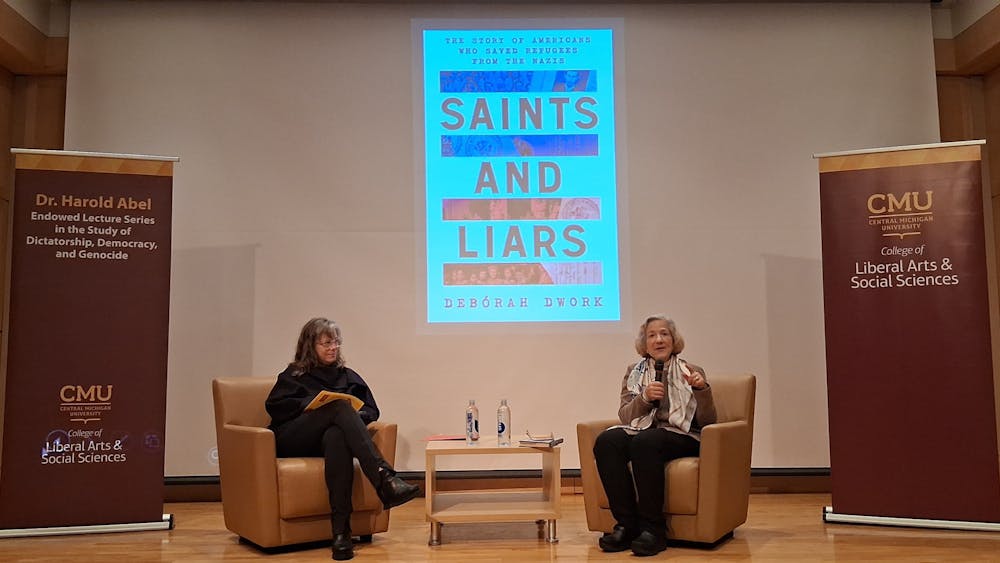Holocaust historian talks about her book at CMU

Dr. Christi Brooks (left) asks Debórah Dwark (right) about her book "Saints and Liars" at Park Library on Nov. 18, 2025.
Historian and author of "Saints and Liars" Debórah Dwork talked about the relevance of her book about American relief workers in Holocaust history to the Mount Pleasant community at Central Michigan University.
The book was inspired after finding a photo of an American woman with a Jewish child, Dwork said. She found the photo when she went through home offices and several other archives to get documents from relief workers who helped people in Europe during the Holocaust.
“I looked at this picture, and I said to myself, who are you?” Dworksaid. “What American would go from the United States to danger in Europe when people at risk in Europe were looking to go the opposite way.”
Christi Brookes, World Languages and Cultures professor, asked Dwork questions in front of the audience as a returning guest of the Abel Lecture Series, which invites scholars to talk about historical events. The Abel Lecture was established in 2009 to memorialize CMU educator, Dr. Harold Abel.
"Saints and Liars" focuses on micro-histories through a collection of stories about Americans who went over to Europe to help people from being prosecuted, such as the Jewish, Dwork said. Those micro-histories are set in five cities: Prague, Vilnius, Shanghai, Marseille and Lisbon.
If people only looked at the big picture of history, then they would not get to know those micro-histories, Dwork said.
She said questioning about daily life during the Holocaust brings everyday stories to light when we narrow our focus. There are lots of details that emerge from looking closer, such as the stories of the relief workers and a collection of their experiences.
“It's a fascinating way to write that history,” Brookes said. “So you do bring it together. In the end, you make some observations from these five different micro-histories that you've written.”
Brookes asked Dwork about the selfless acts American relief workers took while helping others.
The people put themselves in danger by taking risks to help people avoid persecution, Dwork said. This was done by helping them get on trains, getting money after they escaped to Britain and lying for others.
The relief workers were amateurs and didn’t know what they were doing, Dwork said. However, they were people who cared and wanted to do something.
“That decision itself was shaped by their moral commitment, their ethical commitment, and sometimes their religious commitment,” Dwork said.
In her book, she said, one relief worker, Marjorie McClelland, wrote that even though she could only help under a hundred, it was better for them to help the little that they could.
Dwork also read part of her book about one relief worker, Martha Sharp. In summary, Sharp put her own life at risk after saving two strangers on a train by forging their names to get their names registered to stay on the train.
"What lessons did you take away from watching these women who were really, truly extraordinary?" Brookes asked.
Dwork said it is important to look back on what women did during this time. She said they weren’t paid and some worked alone while having the goal to save so many people.
"Sexism put so many obstacles in these women's paths and yet they persevered," Dwork said. "It's the perseverance that I found so remarkable."
While the relief workers were publicized for their work during fundraisers and foundations towards their cause, they were appreciated much more after the war, Dwork said.
"These women and their work is often not remembered, but the book helped show what they did and who they were," Brookes said.
At the end of the lecture, Brookes asked Dwork what one thing she wanted everyone in the room to take away.
“That what happened didn’t have to happen,” Dwork said. “There are so many things we can do in our own lives. They weren’t born to do this work; they came to do it and were ordinary people who did extraordinary things.”



